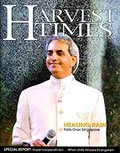Faith alone, not deeds, required for salvation, papal preacher tells pontiff
Here is an excerpt from the article:
"Christianity does not start with that which man must do to save himself, but with what God has done to save him," Capuchin Father Raniero Cantalamessa said in his Dec. 16 Advent meditation.This sermon came from no ordinary Roman Catholic. Raniero Cantalamessa’s website gave the following description of him:
The preacher told the pope and top Vatican officials that they, like St. Paul, must avoid any temptation to think that the good works they have accomplished will guarantee their salvation.
"Gratuitous justification through faith in Christ is the heart" of St. Paul's preaching "and it is a shame that this has been practically absent from the ordinary preaching of the church," he said.
Father Cantalamessa said that the Protestant Reformation debate over the role of faith and works led the Catholic Church to focus so much on the need for the demonstration of faith in actions that it practically ignored the need for faith in the first place.
Raniero Cantalamessa is a Franciscan Capuchin Catholic Priest. Born in Ascoli Piceno, Italy, 22 July 1934, ordained priest in 1958. Divinity Doctor and Doctor in classical literature. Former Ordinary Professor of History of Ancient Christianity and Director of the Department of religious sciences at the Catholic University of Milan. Member of the International Theological Commission (1975-1981).If the Vatican does heeds the advice of Raniero Cantalamessa (though it seems unlikely), then it may have to, for the first time, reverse the canon of the Council of Trent (1545-1563).
In 1979 he resigned his teaching position to become a full time preacher of the Gospel. In 1980 he was appointed by Pope John Paul II Preacher to the Papal Household in which capacity he still serves, preaching a weekly sermon in Advent and Lent in the presence of the Pope, the cardinals, bishops an prelates of the Roman Curia and the general superiors of religious orders.
CANON XII.-If any one saith, that justifying faith is nothing else but confidence in the divine mercy which remits sins for Christ's sake; or, that this confidence alone is that whereby we are justified; let him be anathema.It is only as recently as 1998 in its official Response of the Catholic Church to the Joint Declaration of the Catholic Church and the Lutheran World Federation on the Doctrine of Justification where the Vatican dealt with the doctrine of justification:
The Catholic Church maintains, moreover, that the good works of the justified are always the fruit of grace. But at the same time, and without in any way diminishing the totally divine initiative (5), they are also the fruit of man, justified and interiorly transformed. We can therefore say that eternal life is, at one and the same time, grace and the reward given by God for good works and merits.As we can see, there is no change from its position affirmed at the Council of Trent. However, if the Vatican concludes we are justified by faith alone, then it follows that the sacrament of penance is not needed any more since there is no “lost justice” to be recovered. Its sacramental works-based system can be abolished.
…
In pursuing this study further, it will be necessary to treat also the sacrament of penance, which is mentioned in n. 30 of the Joint Declaration. According to the Council of Trent, in fact (7), through this sacrament the sinner can be justified anew ( rursus iustificari ): this implies the possibility, by means of this sacrament, as distinct from that of baptism, to recover lost justice (8).
There is an interesting article found in Raniero Cantalamessa’s website, which is a transcript of the “talk delivered to the world wide representants of Alpha Course
London, 27 June 2005.”
Very early in the article, I am delighted to see that Cantalamessa affirms the doctrine of Solus Christus, which I am ashamed to say, many evangelicals do not embrace. In particular, he strikes out at the liberals who teach there are many ways to salvation. Actually, in my opinion, he appears to be even more "Protestant" than the megachurch preacher Joel Osteen, who denies the doctrine of Solus Christus.
From this point of view, then, Jesus Christ is very much present and exploited in our culture. But if we turn to the ambit of faith, where he really belongs, we notice a disturbing absence, or even rejection of him. First of all among theologians. One theological current today holds that Christ came for the salvation of the Gentiles, not of the Jews (for whom, they say, it is sufficient to remain faithful to the Old Covenant). Another current says that he is not necessary for the Gentiles either, since they, through their religions, have a direct relationship with the eternal Logos and have no need of any mediation by the Word incarnate or his paschal mystery. We may well ask, for whom then is Christ still necessary?He also spoke of the need to preach the gospel; the importance of evangelism of the gospel above all other social needs. This immediately brings to my mind Matthew 16:26, “What good will it be for a man if he gains the whole world, yet forfeits his soul? Or what can a man give in exchange for his soul?”
The Church is generally accepted and esteemed as a social agency, for her work in favour of peace and social justice, but is ill tolerated or ignored as soon as she starts speaking about Jesus and his Gospel. Ecclesial movements and individuals who dedicate themselves to evangelization and promotion of faith are easily labelled as conservative, reactionary or fundamentalist.Lest I am misconstrued as completely agreeing with him, I would like to state that I strongly disagree with his ecumenism as the heart of the gospel lies in the doctrine of justification. To deny or to misinterpret this doctrine can be eternally fatal. Cantalamessa said,
The affirmation that this salvation is received by faith and not by works is certainly present in the text, and at the time of the Reformation it was the point that most urgently needed to be brought back into focus. But now that we have reached fundamental agreement on this point (see the document issued jointly in 1999 by the Catholic Church and the World Federation of Lutheran Churches), we are challenged to rediscover and together proclaim what was the fundamental point in Paul’s teaching: the universal relevance of Christ’s redemption.Contrary to his speech that implies we can move forward from the doctrine of justification, I would point out that the Common declaration on the Doctrine of Justification issued by the Catholic Church and the Lutheran World Federation (1999) shows no change in the Roman Catholic position – that justification can be lost. The document states:
30. … But when individuals voluntarily separate themselves from God, it is not enough to return to observing the commandments, for they must receive pardon and peace in the Sacrament of Reconciliation through the word of forgiveness imparted to them in virtue of God's reconciling work in Christ.










